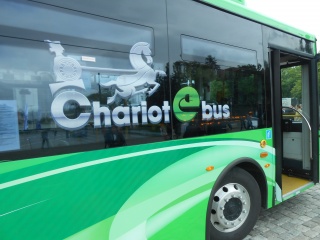The electric revolution of public transport: the Ministry of Transport and Dan Company will run Tel Aviv’s first bus line consisting solely of electric buses in 2015.
A team of the ministry and the bus company will be choosing the line to be converted to electricity in the next few weeks, as a pilot for a significant transition to electric buses.
Dan Company already runs another electric bus made by BYD from China, but this is a deal that will cover 20 electric buses and more advanced technology. Instead of heavy buses, the bus is equipped with capacitors that provide for rapid recharging but lower electrical capacity. Each bus needs three to five minutes of recharging to travel 15 to 25 km, while the average length of a city line is 10 km.
This means that a brief recharge at the terminals is all that is necessary for a bus, which needs not to carry electricity for its entire daily mileage. The bus, which was developed by Israel’s Chariot Motors, is equipped with capacitor technology made by Aowei, China., and is being built by the Chinese firm Higer.
Such buses are already in service in China, and on a first line in Europe, in Sofia, the capital of Bulgaria. Chariot Motors, which belongs to Yoel and Roni Weiss – former importers of BMW, managed by Zwika Zimmerman, former CEO of the importer of the German prestige cars, is already holding advanced negotiations for selling a few dozen such buses in Europe.
The electric bus does not generate the problematic pollution emitted by diesel engines of existing buses and is much quieter. Such a bus costs 1.6 million shekels, compared to 2 million shekels for a battery powered electric bus and 1 million shekels for an ordinary diesel one. The maintenance costs of the new electric bus are much lower than a diesel powered one, and the difference is expected to be returned within three and a half years, while a bus is usually kept in service for nearly 20 years.
Another advantage is the low infrastructure cost required for operating the line. One recharging station for each city line serves a large number of buses operating on that line, compared to a battery powered bus, which requires a separate recharger for each bus.
The new bus has a capacity of about 50 seats, like diesel powered buses. The proposed technology effectively allows the bus to run for 24 hours without any range limits. “The electric bus has a number of major advantages: no pollution of any kind, the cost of the electric energy required is about 20% of that of fuel, significant saving in maintenance costs and quiet operation compared to a diesel powered bus”, said Minister of Transport Israel Katz.
The first bus of the new type is supposed to reach Dan Company this year, and the new clean line will be opened next year as part of a move of the Ministry of Transport to encourage a transition to non-polluting vehicles in the city.









